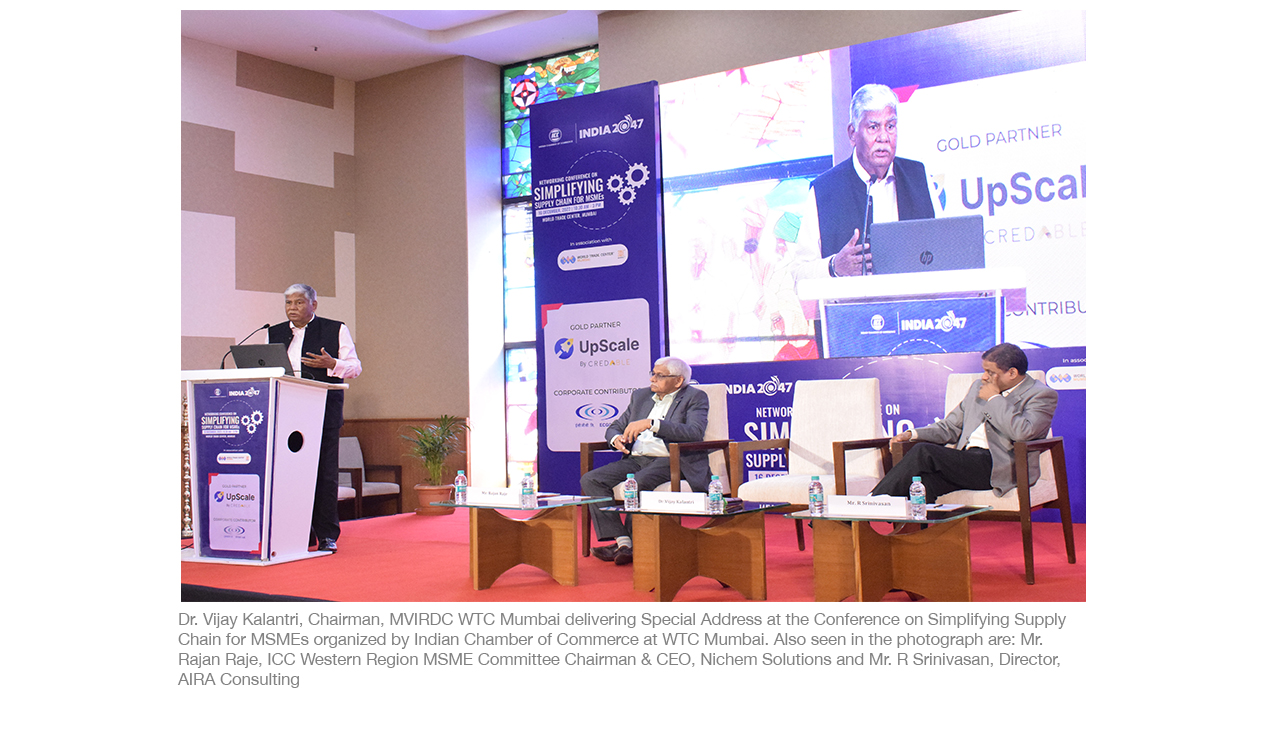“MSMEs are the engine of economic growth and we need to strengthen this sector to attain the vision of USD 30 trillion economy by 2047. MSMEs contribute 45% to India’s exports and they play an important
role in employment generation and industrialization in backward areas. Government of India needs to implement the recommendations of all the task forces and committees set up in the past to revive the micro,
small and medium enterprises (MSMEs) sector. In the past, government and the RBI have set up various committees headed by Mr. Prabhat Kumar, Mr. S.L. Kapoor, Mr. P.J. Naik, Mr. U.K. Sinha and others.
There is a need to implement their recommendations in letter and spirit rather than paying sympathy with mere lip service. The share of MSME credit in overall bank credit has declined from more than 12% in the
past to 8.3% now, even though absolute volume of MSME credit has increased,” said Dr. Vijay Kalantri, Chairman, MVIRDC WTC Mumbai while delivering Special Address at a Conference on Simplifying Supply Chain for
MSMEs organized by Indian Chamber of Commerce at WTC Mumbai.
Dr. Kalantri pointed out that bankers typically prefer to disburse a large portion of the MSME credit to medium enterprises rather than micro and small enterprises due to high transaction cost involved in
disbursing small ticket size of the loans.
Dr. Kalantri emphasized on the need to increase the working capital limit for MSMEs given the rising input cost, led by inflation in steel, plastics, petroleum and other input prices. “Banks should implement
the 20% escalation of credit limit as recommended by the P.J. Nayak committee for MSME loans,” he said.
Dr. Kalantri pointed out, “Even though Government of India announced Emergency Credit Line Guarantee Scheme for MSMEs affected by the pandemic, lenders have disbursed hardly 30% of the amount as the remaining
70% is adjusted against outstanding dues of MSME borrowers.”
Dr. Kalantri suggested Government of India to hold pre-budget consultations with small scale industries associations to consider their challenges and policy suggestions. He also called for frequent interaction
between small scale industries associations and different government departments, right from Prime Minister’s Office to Commerce Ministry and Finance Ministry.
Highlighting the issues in ease of doing business, Dr. Kalantri suggested that all state governments should reduce complex bureaucratic procedures such as inspections and cumbersome paperwork by simplifying
compliance procedures for taxation, labour, pollution and other laws.
MSME clusters have huge potential to export their products in the international market and therefore government agencies can support these clusters in branding, quality certification and testing to
benchmark their products to the global standards.
Government may also subsidize freight and logistics cost of MSMEs as this cost is escalating because of the high fuel prices, he suggested.
Finally, Dr. Kalantri suggested government to take appropriate actions to ensure that large corporate buyers and public sector undertakings repay their dues to MSME vendors within 45 days of the acceptance of
the goods or service.
Earlier in his welcome remarks, Mr. Rajan Raje, ICC Western Region MSME Committee Chairman, CEO, Nichem Solutions pointed out that MSMEs have a major role to play in increasing the share of manufacturing in our
GDP from 18% to 22% as envisaged by Government of India. He informed that MSMEs face major challenges in supply chain, logistics and access to working capital. “High logistics cost affects the margins of MSMEs.
The cost of logistics in India is more than 14% in India, compared to less than 10% in advanced countries and BRICS countries.”
Mr. R Srinivasan, Director, AIRA Consulting proposed vote of thanks for the event.


 : +91 7718886506
: +91 7718886506